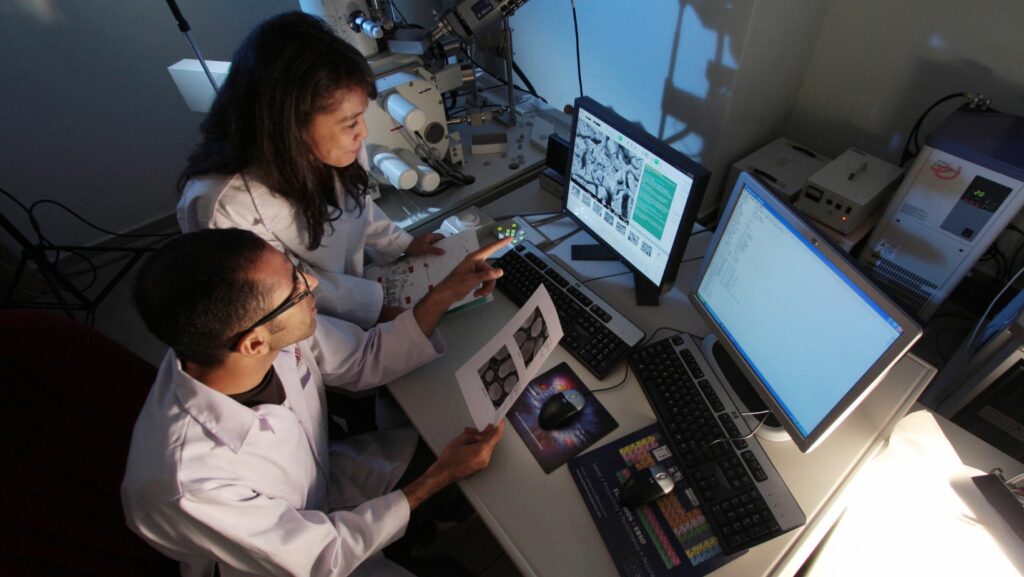”
Key Takeaways
- Critical Role: Industrial scientists are essential in applying scientific principles to improve processes and product quality across various industries, from pharmaceuticals to manufacturing.
- Diverse Responsibilities: Their key responsibilities include leading research and development, overseeing quality control, and driving process improvements while ensuring compliance with industry regulations.
- Essential Skills: A combination of technical skills (analytical, research, regulatory knowledge) and soft skills (communication, teamwork, flexibility) are crucial for success in this field.
- Career Opportunities: With diverse career paths available, industrial scientists can advance to roles such as R&D managers or quality assurance specialists, especially in sectors focusing on innovation and sustainability.
- Challenges Faced: Industrial scientists encounter complexities such as regulatory compliance, rapid technological advancements, resource limitations, and the need for sustainable practices while maintaining efficiency.
- Growing Demand: The increasing focus on innovation and sustainability continues to drive the demand for skilled industrial scientists across multiple sectors, underscoring their significance in modern economies.
In today’s fast-paced world, industrial scientists play a crucial role in bridging the gap between research and practical application. These professionals harness scientific principles to innovate processes, enhance product quality, and drive efficiency across various industries. Their expertise not only fuels technological advancements but also contributes to sustainable practices that address global challenges.
As industries evolve, the demand for skilled industrial scientists continues to rise. They work collaboratively with engineers, marketers, and production teams to ensure that scientific discoveries translate into real-world solutions. From pharmaceuticals to manufacturing, their impact is felt across multiple sectors, making them essential to the progress of modern economies. Understanding the multifaceted role of industrial scientists reveals the importance of their contributions to society and the environment.
Industrial Scientists
 Industrial scientists play a crucial role in various sectors, applying scientific knowledge to solve practical challenges. These professionals engage in research and development, focusing on creating innovative solutions that enhance production processes and product quality. They utilize a range of scientific fields, including chemistry, biology, and engineering, to develop new materials and techniques.
Industrial scientists play a crucial role in various sectors, applying scientific knowledge to solve practical challenges. These professionals engage in research and development, focusing on creating innovative solutions that enhance production processes and product quality. They utilize a range of scientific fields, including chemistry, biology, and engineering, to develop new materials and techniques.
Industrial scientists collaborate closely with engineers and technicians to implement improvements in manufacturing and operational efficiency. Their work often entails conducting experiments, analyzing data, and troubleshooting issues in real-time. By integrating advanced technologies and methodologies, they contribute significantly to minimizing waste and promoting sustainable practices.
The demand for industrial scientists continues to rise due to an increasing focus on innovation and sustainability. These professionals analyze market trends and consumer needs, ensuring that their solutions meet both business objectives and regulatory requirements. Industrial scientists also prioritize safety and environmental impact in their projects, aligning their work with broader societal goals.
Key Responsibilities Of Industrial Scientists
 Industrial scientists undertake a range of critical responsibilities that significantly impact various industries. Their expertise facilitates the development of innovative solutions, enhances product quality, and promotes efficiency. Industrial scientists lead research and development (R&D) initiatives, focusing on innovative solutions. They design experiments, test hypotheses, and analyze outcomes to create new products or improve existing ones. By applying scientific knowledge from disciplines like chemistry and biology, they develop advanced materials and techniques. Collaboration with cross-functional teams occurs frequently, fostering communication between engineers, product designers, and market analysts to align technological advancements with industry needs.
Industrial scientists undertake a range of critical responsibilities that significantly impact various industries. Their expertise facilitates the development of innovative solutions, enhances product quality, and promotes efficiency. Industrial scientists lead research and development (R&D) initiatives, focusing on innovative solutions. They design experiments, test hypotheses, and analyze outcomes to create new products or improve existing ones. By applying scientific knowledge from disciplines like chemistry and biology, they develop advanced materials and techniques. Collaboration with cross-functional teams occurs frequently, fostering communication between engineers, product designers, and market analysts to align technological advancements with industry needs.
Industrial scientists play a key role in quality control, ensuring products meet established standards. They develop testing protocols to assess product reliability and safety. Data analysis helps identify quality issues, enabling scientists to implement corrective measures promptly. This role extends to monitoring manufacturing processes, where they analyze variances and recommend improvements to uphold high-quality benchmarks. Their expertise fosters confidence in product performance across sectors such as pharmaceuticals and food production.
Process Improvement
Industrial scientists concentrate on process improvement to enhance operational efficiency. They assess existing manufacturing procedures, identifying bottlenecks and inefficiencies. Through applied scientific methods and innovations, they streamline workflows and reduce resource waste. Techniques like Lean Six Sigma are often used to optimize processes. The emphasis on sustainability drives them to promote technologies that minimize environmental impact while maximizing productivity, ensuring alignment with societal and regulatory expectations.
Essential Skills For Industrial Scientists
Industrial scientists require a blend of technical and soft skills to excel in their roles, ensuring they effectively address challenges in various industries.
Technical Skills
- Analytical Skills: Industrial scientists must evaluate complex data sets, enabling them to draw meaningful conclusions from experimental results.
- Research Skills: Proficiency in designing and conducting experiments supports the development or enhancement of products and processes.
- Knowledge of Scientific Principles: A strong foundation in chemistry, biology, and physics helps scientists apply relevant theories to real-world applications.
- Familiarity with Software Tools: Competence in data analysis and modeling software, like MATLAB or R, aids in processing and visualizing scientific data.
- Regulatory Knowledge: Awareness of industry regulations ensures compliance in product development and quality assurance processes.
- Project Management: Skills in managing timelines, resources, and budgets facilitate the successful execution of research and development initiatives.
- Collaborative Mindset: Teamwork with engineers, designers, and production staff fosters innovation and problem-solving.
- Communication Skills: The ability to convey complex scientific concepts clearly to non-scientific stakeholders is essential for project alignment and success.
- Problem-Solving Abilities: Innovative thinking aids in addressing challenges and implementing effective solutions within manufacturing processes.
- Flexibility: Adapting to changing circumstances and project requirements allows industrial scientists to navigate the dynamic nature of their work environments.
- Attention to Detail: Ensuring precision in experiments and data analysis helps maintain high-quality standards and accurate results.
- Time Management: Efficiently prioritizing multiple tasks enhances productivity, ensuring that project deadlines are consistently met.
Career Path And Opportunities
Industrial scientists follow diverse career paths within various sectors. They typically begin their journeys by obtaining a bachelor’s degree in fields such as chemistry, biology, or engineering. Many advance their education with master’s or doctoral degrees, enhancing their expertise and research capabilities.
Positions available to industrial scientists include research and development roles, quality assurance specialists, and process improvement managers. In pharmaceuticals, industrial scientists may work on drug formulation, testing, and regulatory compliance, while those in manufacturing might focus on optimizing production efficiency and implementing sustainable practices.
Advancement opportunities abound for industrial scientists. They can progress to leadership positions such as R&D managers or project directors, overseeing teams and managing budgets. Specialized roles in regulatory affairs or technical sales also provide avenues for growth, allowing them to leverage their scientific knowledge in different contexts.
Networking within professional organizations, attending industry conferences, and pursuing continuing education are vital for advancing careers. Certifications in quality control, project management, or specific technologies can enhance career prospects and demonstrate commitment to ongoing professional development.
The demand for industrial scientists spans multiple industries. Opportunities exist in pharmaceuticals, biotechnology, food production, and materials science. As industries continuously seek innovation, the need for skilled professionals who can translate scientific research into practical applications remains high.
Challenges Faced By Industrial Scientists
Industrial scientists encounter multiple challenges that affect their ability to innovate and implement solutions effectively.
Complex Regulatory Environments
Industrial scientists navigate intricate regulations that vary by industry and region. Compliance with these standards poses significant hurdles, as maintaining safety and environmental guidelines necessitates continuous education and adaptation.
Rapid Technological Advancements
Technological evolution occurs at a fast pace, compelling industrial scientists to stay updated with the latest tools and methodologies. Adopting new technologies requires ongoing training and investment, which may strain resources.
Collaboration Across Disciplines
Effective collaboration with engineers, product designers, and market analysts often presents difficulties. Aligning different perspectives and objectives can lead to misunderstandings or miscommunication, impacting project timelines and outcomes.
Resource Limitations
Industrial scientists frequently encounter constraints regarding funding and access to materials. Limited resources can hinder experimentation, reduce the scope of research and development initiatives, and delay the implementation of innovations.
Balancing Innovation and Cost-Effectiveness
Industrial scientists strive to drive innovation while keeping costs in check. The challenge lies in finding ways to enhance processes or products without exceeding budget constraints, which often limits the scope of potential projects.
Sustainability Pressures
Environmental concerns influence industrial practices significantly. Industrial scientists face pressure to develop sustainable solutions while maintaining productivity and meeting market demands. This dual requirement complicates decision-making processes.
Work-Life Balance
The demanding nature of the field often disrupts work-life balance. Industrial scientists may experience long hours or high-stress situations due to project deadlines, leading to challenges in personal well-being and job satisfaction.
Intellectual Property Concerns
Protecting innovations and intellectual property is vital, yet complex. Industrial scientists must navigate legal frameworks to prevent unauthorized use of their work while fostering collaboration with external partners.
Addressing these challenges requires resilience, adaptability, and continual learning, empowering industrial scientists to remain effective in their roles.
Industrial scientists are essential to driving innovation and efficiency across various sectors. Their unique blend of technical and soft skills positions them to tackle industry challenges while promoting sustainable practices. As they collaborate with diverse teams, their contributions lead to significant advancements in product quality and process improvement.
The career landscape for industrial scientists is expanding, offering numerous opportunities for growth and specialization. With the increasing demand for their expertise, these professionals are poised to make an even greater impact on society and the environment. Embracing continual learning and networking will further enhance their ability to adapt and thrive in this dynamic field.



